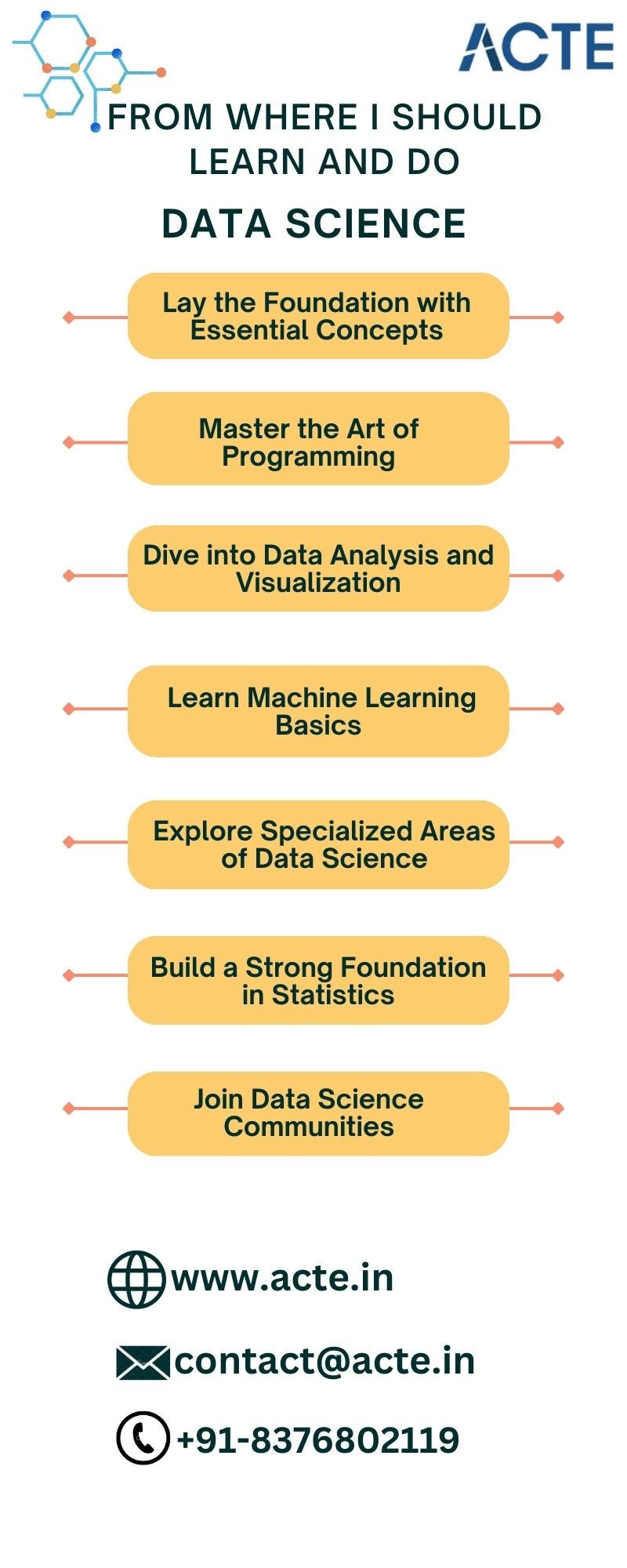Embarking on Your Data Science Journey: A Simple Guide to Learning and Application
Welcome to the dynamic realm of data science, where patterns are unveiled, predictions are made, and informed decisions emerge from raw data. If you're enthusiastic about entering this field but uncertain about the starting point, this blog provides a clear path to mastering the basics and applying your newfound knowledge. Enhancing your career at the Data Science Course in Hyderabad with placements involves taking a systematic strategy and enrolling in a suitable course that will greatly expand your learning journey while matching with your preferences.

Step 1: Establish a Solid Foundation in Essential Concepts Initiate your data science journey by grasping fundamental concepts. Platforms like Khan Academy, Coursera, and edX offer introductory courses in statistics, mathematics, and programming, forming the cornerstone for more advanced data science skills. For those looking to excel in Data Science, Data Science Online Training is highly suggested. Look for classes that align with your preferred programming language and learning approach.
Step 2: Hone Your Programming Skills Python and R stand as the primary programming languages for data scientists. Interactive lessons on platforms like Codecademy and W3Schools for Python and RStudio and DataCamp for R will help you become proficient in basic programming constructs, data structures, and syntax.
Step 3: Immerse Yourself in Data Analysis and Visualization Once comfortable with programming, shift your focus to data analysis and visualization. Explore datasets and create visualizations using platforms like Kaggle, Google Colab, and Jupyter Notebooks, incorporating libraries like Pandas, Matplotlib, and Seaborn. This step enhances your ability to extract meaningful insights from raw data.
Step 4: Acquire a Fundamental Understanding of Machine Learning Machine learning serves as a cornerstone in data science. Platforms such as fast.ai, TensorFlow, and scikit-learn offer tutorials for grasping the basics. Begin with supervised learning algorithms like linear regression, gradually progressing to more intricate models such as decision trees and neural networks.
Step 5: Delve into Specialized Areas of Data Science Data science encompasses diverse specialized areas. Select an area aligned with your interests and career goals. For data visualization, explore tools like Tableau and Power BI. For big data, delve into Hadoop and Spark. Specialized courses on platforms like Udacity and LinkedIn Learning can deepen your expertise in these niches.
Step 6: Establish a Strong Foundation in Statistics Statistics forms the backbone of data science, influencing experimental design, data analysis, and result interpretation. Review concepts such as hypothesis testing, probability, and regression analysis. Books like "The Art of Statistics" by David Spiegelhalter, along with online courses, can solidify your statistical knowledge.
Step 7: Engage with Data Science Communities Connect with peers and professionals in the field by joining online communities. Platforms like Reddit (r/datascience), LinkedIn, and Stack Overflow are excellent places to seek advice, share insights, and stay updated on industry trends.

Embarking on your data science journey may appear overwhelming, but with the right resources and a systematic approach, you can build a robust foundation and confidently apply your skills. Remember, practice is paramount, so engage in real-world projects, participate in online competitions, and continually seek to expand your knowledge. Wishing you a fulfilling journey of learning and application!
If you want to learn about data science, you should contact Data Science Training in Hyderabad. Experienced teachers can help you learn more effectively. To live life to the fullest and improve your learning process, they provide certification programs and job placement opportunities guided by professional educators. You can obtain these resources in person or online. Taking a step-by-step approach and considering enrolling in a course may be useful if it matches your interests. If you find this answer useful, please upvote and leave your thoughts in the comments. Thank you. I wish you a good day ahead.